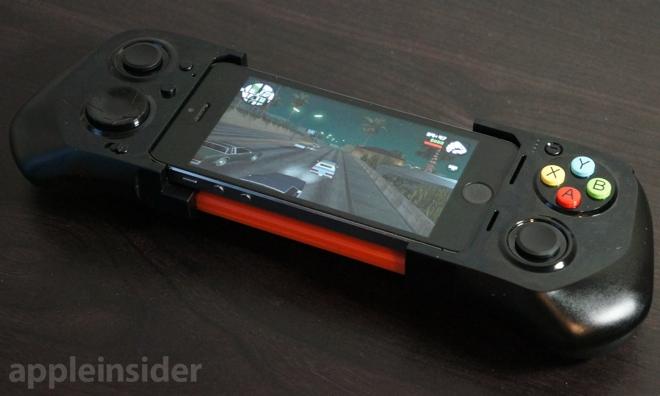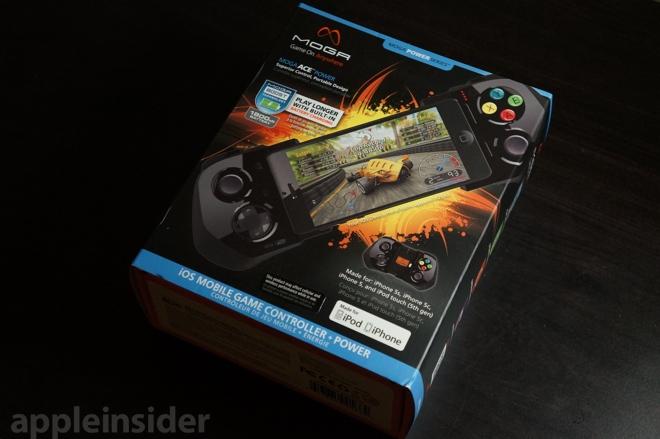As one of the first two Made for iPhone gaming controllers to hit the market, the Moga Ace Power holds the distinction of being the best option you can buy right now, sporting a number of commendable features and greatly enhancing gaming on Apple's iPhone. But that doesn't mean the accessory is worth its hefty $100 price tag.

The Moga Ace Power is compatible with Apple's iPhone 5s, iPhone 5c, iPhone 5, and fifth-generation iPod touch. It, along with the Logitech PowerShell Controller, is one of the first two Apple-certified Made for iPhone gaming controllers available.
Both devices are priced the same, at $99.99, though that's largely where the comparisons end. While far from perfect, and not a particularly great value, the Moga controller is a better value and a more full-featured controller for traditional gamers, and is our recommendation for those deciding among the two.
Design and feel
The real selling point of the Moga controller is that it's currently the only truly full-featured modern gaming controller available for the iPhone. Like all current major game consoles, the accessory features two joysticks (though these are "circle pads" like on the Nintendo 3DS rather than full joysticks), a D-pad, four face buttons, and four shoulder buttons.
The unique design of the Moga controller allows it to be collapsible, making it easier to throw in a bag and carry around. Once stretched out, the controller can be "overstretched" to squeeze in a compatible iOS device.
The Moga Ace Power sports an integrated Lightning plug, which serves a variety of purposes. Most importantly, it allows the buttons on the device to work with compatible games on the iPhone, but it also allows the integrated battery to recharge a connected device.

Notably, the Lightning connector also allows for audio passthrough, making it easy for users to plug a set of headphones into the controller itself. This is an important distinction from Logitech's offering, which requires what is quite frankly a ridiculous "elbow" adapter included with the product for headphone use.
On the front of the left side of the controller are the left joystick, D-pad, a pause button, and a switch to enable the battery for charging. Another button is included to physically press the lock button atop a connected iOS device to lock the screen.
On the right side are four face buttons, labeled "A," "B," "X," and "Y." A battery status button lights up four red LEDs to show how much charge is left in the integrated battery, and a right analog stick allows for camera or aiming controls in applicable games.
Up top, four shoulder buttons can be found: Two regular buttons named "L1" and "R1," and two trigger-style buttons labeled "L2" and "R2." A micro-USB port for recharging the battery is also available.
Finally, on the back of the device is a locking switch, which ensures the iPhone cannot be removed from the controller when activated, as well as a hole where a pin can be inserted to reset the controller.
Unfortunately, the construction of the Moga controller does not feel solid when you first get it in your hands. Its collapsible design is somewhat wobbly and flimsy, though this may be by design.
We say this because once we inserted our iPhone 5s, the whole controller became rigid and solid. It's possible that some of the "give" to the controller could be to accommodate iPhones of different sizes.
That said, the design of the Moga Ace Power could use work in future iterations. The wobbliness when unplugged from an iPhone does not inspire confidence in its build quality, while the buttons are a hit-or-miss affair.
The circle pad joysticks are serviceable, but don't feel as comfortable as the comparable style flat joystick on the Nintendo 3DS. The face buttons and "1" numbered shoulder buttons have appropriate give, but the "2" numbered shoulder buttons feel somewhat "mushy" and are not satisfying to pull.
Another button that gave us some concern was the "lock" mechanism, which, again, physically presses the button atop the iPhone. When the button is pressed when an iPhone is not inserted, the bending plastic elbow reminded us of components on other accessories that were prone to bend and break over time. That said, it worked fine for our brief test period.
Usage and games
When connected to an iPhone, the Moga controller certainly looks goofy. With the buttons located to the left and right of the screen, the controller is long and appears unwieldy. With its questionable iPhone-free construction and particularly elongated appearance once attached, the Moga does not make a good first impression.
Perhaps its most direct comparison is the PlayStation Vita, a single-screen mobile gaming device with dual joysticks and a large touchscreen. An iPhone 5s with the Moga Ace Power attached is significantly wider than the Vita.
Thankfully, we found that once we connected an iPhone and started to play games, most of those concerns over the form factor melted away. Plugging in the controller to an iPhone 5s was quick and easy, and no setup was required for the accessory to begin working with supported games.
Dual-stick control in a title like Dead Trigger 2 felt natural, and after using the Moga Ace Power, it's hard to imagine going back to playing such console-style games with touch-only controls.
The inclusion of dual joysticks is particularly important, as it means that modern 3D games -- in particular first-person shooters -- can be played the way that "hardcore" console gamers have become accustomed to.
There is absolutely no question that a game like Dead Trigger 2 or Grand Theft Auto: San Andreas is infinitely better with physical controls. The debut of Moga's Ace Power means that titles, and new ones to come, like this can become more full featured, and be viable options for serious, more traditional gamers.
That said, there are still improvements to be made on the software front. Not all games make it entirely clear when a player can select items on the screen with the controller, and when they must actually touch the display.
Navigating the main menus in Galaxy on Fire 2 HD, for example, requires users to use the touchscreen to navigate menus. Most other games allow menu control via physical input.
Let's take a few moments to talk about Galaxy on Fire 2, because it's a prime example of what's wrong with Made for iPhone gaming controllers at launch.
Since it's difficult to know exactly what games support physical controllers, we searched online and found that Galaxy on Fire 2 HD was supported. So, we searched the App Store and installed the free game Galaxy on Fire 2.
To our frustration, we could not get the Moga Ace Power to work with Galaxy on Fire 2. Nothing appeared in the game's options menu, and there was no indication that a controller was connected.
Then we realized our own folly: The Moga Ace Power is supported by Galaxy on Fire 2 HD, which is a completely different download on the App Store from Galaxy on Fire 2 (non-HD). Installing Galaxy on Fire 2 HD solved the issue.
And in our tests with another game, Asphalt 8: Airborne, we could not get the title to work with Moga's controller. The game would actually detect the controller, but navigating to the controls settings just showed a placeholder of "(Text)" for all of the button function descriptions.
However, when Logitech's Made for iPhone controller is plugged in, Asphalt 8 works perfectly fine with that peripheral. This leads us to believe that Moga's dual-joystick design is incompatible with the title, while Logitech's D-pad-only form factor is not. This is particularly disappointing because the Moga controller has analog triggers that would be better suited for adjusting speed while pressing the virtual gas pedal in a racing game.
To be fair, these issues fall squarely on Apple. Without a dedicated section in the App Store identifying Made for iPhone controller-compatible games, it's impossible to know for sure what works. And even then, a title may be compatible with a controller other than the one you own. At the moment, it's too confusing.
That is to say that the experience so far is decidedly un-Apple. It's not intuitive or easy to figure out, and casual gamers will come away especially frustrated.
Conclusion
We bought the Moga Ace Power at a discounted price of $80 at major U.S. electronics retailer Best Buy, which made the purchase slightly more palatable. But even at $80, it's hard to recommend this accessory to all but the most extreme of mobile gamers.
In contrast, a new Xbox One controller or a PlayStation 4 DualShock 4 controller are both sold for $60. Like the Moga Ace Power, they include integrated batteries. And unlike the Moga Ace Power, they also include wireless connectivity to pair them to their respective consoles.
Why do the first Made for iPhone controllers cost so much? Perhaps it's associated with Apple's licensing. Perhaps it's the cost of being first to market. We don't know the answer, but regardless, we can't recommend either the Moga or Logitech offerings at $100 retail. At $50, the Moga would be an easier recommendation -- but that's half of its current retail price.
At this point, there is also the question as to whether a "case" style design for a gaming controller is ideal for the iPhone. We can't help but think that a wireless controller might be a better form factor for many gamers. Such an accessory could feature a clamp that could hold an iPhone up top, while also allowing users to connect to the iPad for gaming on a bigger display.
Moga's first outing, in contrast, is an iPhone-only affair, despite the fact that most top-tier iOS titles are available on both iPhone and iPad.
Apple's Made for iPhone controller rules do allow for entirely wireless controllers, so it's only a matter of time before those start to hit the market. Of course, such accessories won't have the integrated battery functionality offered by the Moga Ace Power, which is a distinct advantage when playing taxing 3D games on your iPhone on the go.
But that's the beauty of choice: Users will be able to decide whether they want a case-style controller with an integrated battery, or a wireless one that could connect to iPhone, iPad, and potentially a future Apple TV with game support.
There's a lot to like about the Moga Ace Power, and we were surprised how much we enjoyed the controller after its flimsy plastic construction and squishy shoulder triggers left us with a poor first impression out of the box. The truth is this accessory makes playing games on the iPhone a lot more fun, and a lot less frustrating.
If you're a die-hard, dedicated iPhone gamer who doesn't mind the high price tag, you'll likely be satisfied with the Moga Ace Power. It does what it sets out to do.
For everyone else, though, we can't recommend this product at $100. There aren't enough games available, Apple's efforts to identify such games on the App Store are currently nonexistent, and the high price tag doesn't justify putting up with either.
Score: 2.5 out of 5
Pros
- Console-style games are vastly superior with physical controls
- The unique collapsing design makes it slightly portable, though its wobbly construction when the iPhone is removed doesn't inspire confidence
- Integrated battery means you'll keep gaming on the go for longer
Cons
- We can't recommend spending suggested price of $100 for this accessory
- iPhone-only. Sorry, iPad gamers --Â you'll have to wait for wireless controllers to arrive
- Where are the games? No, seriously -- Apple, tell us. We don't know.
Where to buy
The Moga Ace Power retails for $99.99, but it's currently on sale at Best Buy for $79.99, a $20 savings. Other retailers such as Apple also offer the iPhone accessory for its regular retail price.